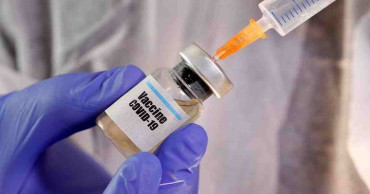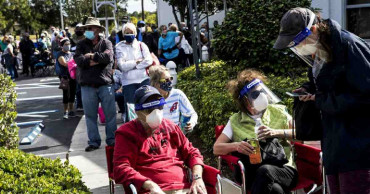Vaccine Shots
10 million vaccine shots to be administered on Feb 26: Health Minister
The government has taken an initiative to administer at least 10 million Covid-19 vaccine doses on February 26 to achieve the target of vaccinating 90 percent of people in the country, said Health and Family Welfare Minister Zahid Malik on Thursday.
To implement the initiative, the Health and Family Welfare Minister has already sat in several meetings with the officials of his ministry and the Directorate General of Health Services, said a PID handout.
The meetings expressed optimism that if 90 percent of the targeted people could be brought under the vaccination coverage, both the infection and death rates would decline .
In the meetings, a number of plans were taken to implement the fresh inoculation drive.
Read: Covid in Bangladesh: 20 more die as positivity rate stands at 10.24 %
As per the plans, at least 10 million people from the floating communities who have not yet been vaccinated yet, will be selected in upazilas, municipalities and city’s wards, community centres or other places designated by the government, in order to bring them under the vaccination coverage.
Some 6.55 million vaccine shots will be provided in different levels on the day (February 26), including 4.14 million doses in 13,800 wards in the upazilas, 0.324 million doses in 1068 wards in the municipalities, 2.0925 million shots in 465 wards in cities.
Read: Prepare universal pension scheme for all: Hasina
Besides, 3.5 million vaccine doses will be given to special communities including workers in various factories, markets, restaurants, boats, launches and ships, brick kilns and other floating communities.
No vaccine registration or birth registration certificate will be required to get vaccinated against Covid on February 26.
4 years ago
Pfizer to seek OK for 3rd vaccine dose; shots still protect
Pfizer is about to seek U.S. authorization for a third dose of its COVID-19 vaccine, saying Thursday that another shot within 12 months could dramatically boost immunity and maybe help ward off the latest worrisome coronavirus mutant.
Research from multiple countries shows the Pfizer shot and other widely used COVID-19 vaccines offer strong protection against the highly contagious delta variant, which is spreading rapidly around the world and now accounts for most new U.S. infections.
Two doses of most vaccines are critical to develop high levels of virus-fighting antibodies against all versions of the coronavirus, not just the delta variant -- and most of the world still is desperate to get those initial protective doses as the pandemic continues to rage.
Also read: AstraZeneca, Pfizer vaccines effective against Delta Covid-19 variants: Study
But antibodies naturally wane over time, so studies also are underway to tell if and when boosters might be needed.
On Thursday, Pfizer’s Dr. Mikael Dolsten told The Associated Press that early data from the company’s booster study suggests people’s antibody levels jump five- to 10-fold after a third dose, compared to their second dose months earlier.
In August, Pfizer plans to ask the Food and Drug Administration for emergency authorization of a third dose, he sai.
Why might that matter for fighting the delta variant? Dolsten pointed to data from Britain and Israel showing the Pfizer vaccine “neutralizes the delta variant very well.” The assumption, he said, is that when antibodies drop low enough, the delta virus eventually could cause a mild infection before the immune system kicks back in.
But FDA authorization would be just a first step -- it wouldn’t automatically mean Americans get offered boosters, cautioned Dr. William Schaffner, a vaccine expert at Vanderbilt University Medical Center. Public health authorities would have to decide if they’re really needed, especially since millions of people have no protection.
Also read: Bangladesh rolls out Pfizer vaccine at 3 Dhaka centers
“The vaccines were designed to keep us out of the hospital” and continue to do so despite the more contagious delta variant, he said. Giving another dose would be “a huge effort while we are at the moment striving to get people the first dose.”
Hours after Pfizer’s announcement, U.S. health officials issued a statement saying fully vaccinated Americans don’t need a booster yet.
U.S. health agencies “are engaged in a science-based, rigorous process to consider whether or when a booster might be necessary,” the FDA and Centers for Disease Control and Prevention said in a joint statement. That work will include data from the drug companies, “but does not rely on those data exclusively,” and any decision on booster shots would happen only when “the science demonstrates that they are needed,” the agencies said.
Currently only about 48% of the U.S. population is fully vaccinated — and some parts of the country have far lower immunization rates, places where the delta variant is surging. On Thursday, Dr. Rochelle Walensky, the CDC director, said that’s leading to “two truths” — highly immunized swaths of America are getting back to normal while hospitalizations are rising in other places.
“This rapid rise is troubling,” she said: A few weeks ago the delta variant accounted for just over a quarter of new U.S. cases, but it now accounts for just over 50% — and in some places, such as parts of the Midwest, as much as 80%.
Also read: European regulators OK Pfizer vaccine for children 12-15
Also Thursday, researchers from France’s Pasteur Institute reported new evidence that full vaccination is critical.
In laboratory tests, blood from several dozen people given their first dose of the Pfizer or AstraZeneca vaccines “barely inhibited” the delta variant, the team reported in the journal Nature. But weeks after getting their second dose, nearly all had what researchers deemed an immune boost strong enough to neutralize the delta variant — even if it was a little less potent than against earlier versions of the virus.
The French researchers also tested unvaccinated people who had survived a bout of the coronavirus, and found their antibodies were four-fold less potent against the new mutant. But a single vaccine dose dramatically boosted their antibody levels — sparking cross-protection against the delta variant and two other mutants, the study found. That supports public health recommendations that COVID-19 survivors get vaccinated rather than relying on natural immunity.
The lab experiments add to real-world data that the delta variant’s mutations aren’t evading the vaccines most widely used in Western countries, but underscore that it’s crucial to get more of the world immunized before the virus evolves even more.
Researchers in Britain found two doses of the Pfizer vaccine, for example, are 96% protective against hospitalization with the delta variant and 88% effective against symptomatic infection. That finding was echoed last weekend by Canadian researchers, while a report from Israel suggested protection against mild delta infection may have dipped lower, to 64%.
Whether the fully vaccinated still need to wear masks in places where the delta variant is surging is a growing question. In the U.S., the CDC maintains that fully vaccinated people don’t need to. Even before the delta variant came along, the vaccines weren’t perfect, but the best evidence suggests that if vaccinated people nonetheless get the coronavirus, they’ll have much milder cases.
“Let me emphasize, if you were vaccinated, you have a very high degree of protection,” Dr. Anthony Fauci, the U.S. government’s top infectious disease expert, said Thursday.
In the U.S., case rates have been rising for weeks and the rate of hospitalizations has started to tick up, rising 7% from the previous seven-day average, Walensky told reporters Thursday. However, deaths remain down on average, which some experts believe is at least partly due to high vaccination rates in people 65 and older — who are among the most susceptible to severe disease.
4 years ago
Pfizer, Sinopharm shots to start June 19: Health Minister
Bangladesh will start administering Sinopharm and Pfizer vaccine doses from June 19, Health Minister Zahid Maleque said on Monday.
“The vaccination drive will start with the number of vaccines available,” he said.
He also expressed worries over the deterioration of the pandemic situation in many places of the country.
Also read: Registered people will get Pfizer vaccine first, says health minister
“The situation is deteriorating in many places. People have to be aware. Hospital services will be disrupted if covid increases more as there is a shortage of hospital beds in some places,” he said.
“We have to emphasise more on prevention than cure,” he added.
A consignment of 600,000 doses of China’s Sinopharm jabs arrived here on Sunday, nine days after the arrival of the first batch of 500,000 doses gifted by Beijing.
Also read: Second consignment of Sinopharm vaccine arrives
Bangladesh has also received 100,620 doses of the Pfizer Covid-19 vaccine on June 1 .
The health minister earlier said that Pfizer vaccine shots will be given at four centres in Dhaka to those who have already registered.
Read Can I take COVID vaccines from two different brands?
4 years ago
Race to vaccinate millions in US off to slow, messy start
Terry Beth Hadler was so eager to get a lifesaving COVID-19 vaccination that the 69-year-old piano teacher stood in line overnight in a parking lot with hundreds of other senior citizens.
5 years ago


.jpg)


